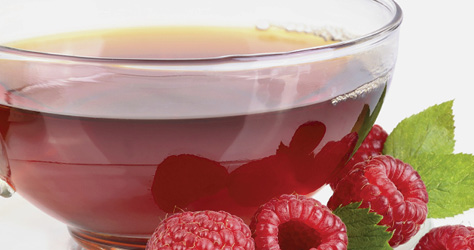What is Raspberry leaf tea?
Raspberry leaf tea is a type of herbal tea that has a number of benefits due to its high content of vitamins, minerals and tannins. The reason for its popularity among mums-to-be is that it’s thought drinking raspberry leaf tea can help to strengthen the uterus wall, with the potential benefit of speeding up labour.
At a glance
- Raspberry leaf tea is believed to help bring on labour
- It is rich in nutrients that are thought to help the uterine muscles
- It is believed to help your milk come in and reduce post-delivery bleeding

Will raspberry leaf tea help in labour?
Lots of mums start drinking raspberry leaf tea late in pregnancy in the belief it will help bring on labour, or make for an easier and speedier time in the delivery room. Which sounds amazing, but how powerful is it really?
Evidence to support raspberry leaf tea benefits?
Sadly, despite often being cited as a sure fire way to evict overdue babies, there is no actual hard evidence to support this. Raspberry leaf is rich in nutrients though, including an alkaloid called fragine, which is thought to help strengthen the uterine muscles which could make your contractions more productive (note the 'could'!) which can help to speed up the 2nd stage of labour.
Raspberry leaf tea is also thought to potentially help your milk come in, reduce post-delivery bleeding and be effective at helping your uterus shrink back to its pre-baby size.
When can I start to drink raspberry leaf tea?
It’s advised that you start drinking raspberry leaf tea at around 32 weeks pregnant to give it a chance to build up in your body and have an effect. At first you should stick to drinking 1 cup a day and then after a few weeks build up to 2 cups and then 3.
Is there any reason to avoid drinking it?
There are a few situations where drinking raspberry leaf tea isn’t a good idea. These include the following:
· You’re overdue – the possibility of more intense contractions could distress your baby
· If you’ve had a Cesarean before or you’re scheduled to have one
· If you’ve had a premature labour before
· If you’ve had bleeding or spotting in the 2nd half of pregnancy
· If a previous labour lasted three hours or less
Speak to your midwife if you’re unsure whether to try it
Sounds good, doesn't it? But before you order in a truck load of teabags (or tablets), have a chat with your midwife first as it's not suitable for all mums-to-be, and should not be drunk before a certain time in your pregnancy, so get the green light before stocking up and sticking the kettle on.
And a word on herbal and fruit teas generally in pregnancy – our obstetrician and foetal medicine consultant Richard Smith says that while 'herbal teas, such as nettle, chamomile and peppermint are a great caffeine-free alternative to tea and coffee' he advises that some preparations can have 'lots of strange sounding ingredients in them'. On the basis 'herbs can be powerful', he recommends mums-to-be check with their midwife if they are unsure about any of the ingredients in their chosen cuppa.